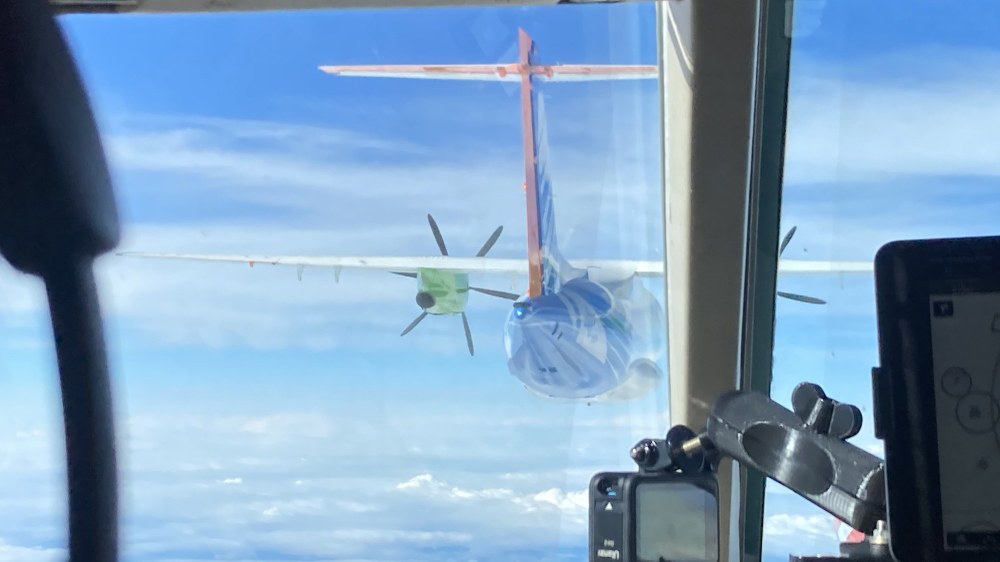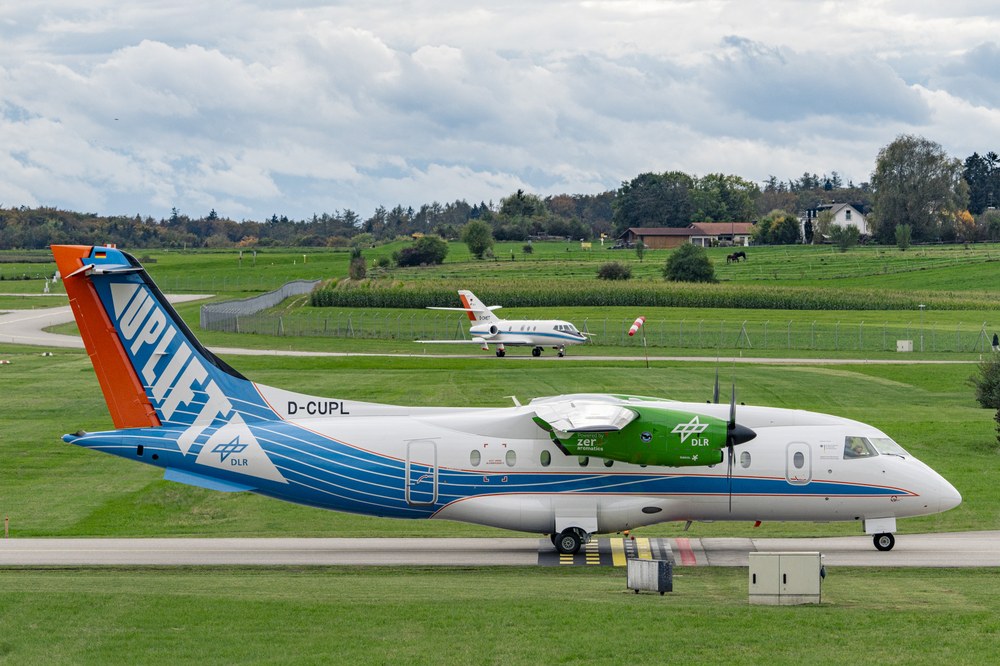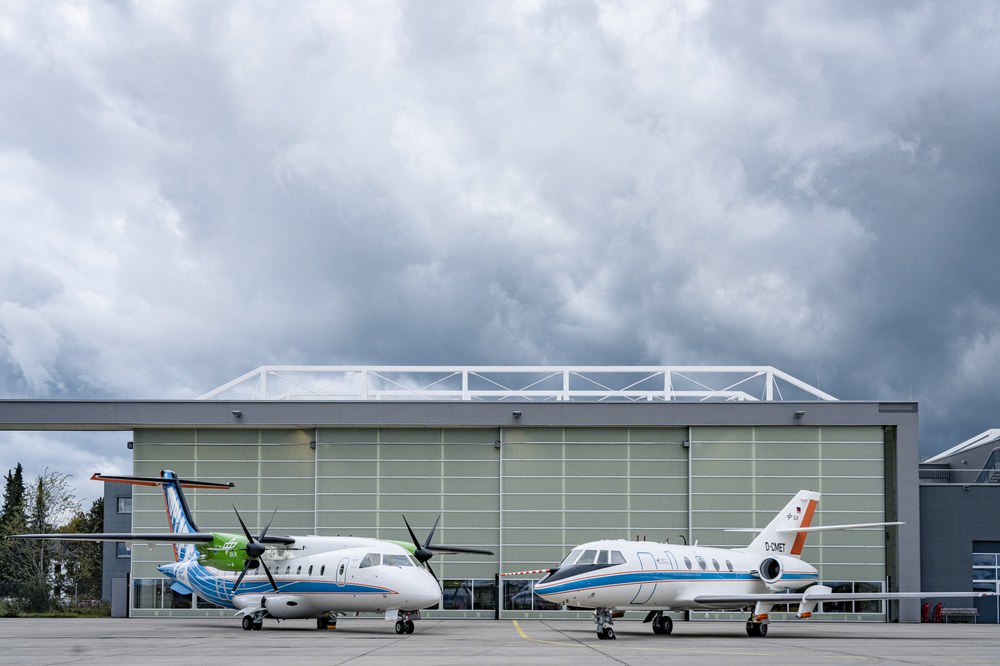Climate-compatible aviation: flying lab measures emissions from turboprop using 100 percent synthetic fuel for first time



- World's first in-flight emissions measurements behind a turboprop aircraft powered by 100 percent synthetic Fischer-Tropsch fuel.
- The measurements serve as a basis for the climate assessment of electricity-based, aromatics-free aviation fuels.
- Electricity-based fuels offer promising prospects for reducing the carbon footprint of aviation and the climate impact of contrails in the future.
- Focus: Aviation, climate-compatible flying, sustainable fuels
In October 2024, the German Aerospace Center (Deutsches Zentrum für Luft- und Raumfahrt; DLR) and the aircraft manufacturer Deutsche Aircraft are conducting the world's first measurement flights in the tailwind of a turboprop aircraft powered by 100 percent synthetic, aromatics-free fuel. From a distance of 50 to 500 metres, the DLR Falcon aircraft measures the emissions of the D328® UpLift. The aim is to reduce not only the carbon footprint of aviation, but also the particulate emissions and climate-impacting condensation trails – contrails – thus paving the way for climate-compatible aviation. Initial measurements have already taken place at Oberpfaffenhofen Airport, both on the ground and with four research flights all using 100 percent synthetic fuel. Six further research flights are planned between now and the end of October 2024.
"Sustainable fuels will play an important role in climate-compatible aviation in the future, and in particular electricity-based fuels suitable for large-scale production," explains Markus Fischer, DLR Divisional Board Member for Aeronautics. "That is why I'm particularly pleased that our new D328 UpLift research aircraft is the first in the world to fly with such a synthetic, aromatics-free fuel in its turboprop engines for its research campaign debut. With our Falcon 20E 'flying laboratory', we are contributing DLR's outstanding expertise to the direct measurement of emissions and their resulting contrails directly in flight."
Previous flight tests conducted by DLR in collaboration with NASA and Airbus have already shown that the use of sustainable biofuel leads to a reduction in soot particles, ice crystals and global warming caused by contrails. The CLIM0ART project (Climate Impact-driven Emission and Contrail Measurements of 0 Aromatic fuels in Regional Turboprop Aircraft) is now investigating whether similar effects can be achieved with synthetic aromatics-free fuels. A further aim is to carry out the first measurements of emissions from a turboprop aircraft in flight. Unlike for jet aircraft, there is no publicly-available emissions data for this type of vehicle. Such information is needed as a reference for modelling the climate effects of the current and future regional fleet.
"The CLIM0ART project is another piece in the puzzle of our holistic approach to optimise the environmental impact of our aircraft, with the aim of implementing the latest scientific findings for the climate as quickly as possible in our D328eco aircraft, which is currently under development," says Nico Neumann, Chief Operations Officer at Deutsche Aircraft. "This achievement not only highlights the potential of synthetic fuels, but also the importance of collaboration between industry and research institutions."
After being handed over to DLR, the D328 UpLift® research aircraft first had to be prepared for use with aromatics-free fuel. Seals were replaced and the fuel system and engines were modified and tested for operation with aromatics-free fuels. The flights are being carried out as test flights because the use of 100 percent synthetic aromatics-free fuels is not yet fully certified.
Flying in the exhaust plume
A joint research flight takes off from Oberpfaffenhofen Airport. The DLR research aircraft D328® UpLift and Falcon 20E then fly into an airspace reserved for the flight tests. "Here, both aircraft take measurements for about two hours, during which the Falcon flies into the exhaust stream at distance of 50 metres and samples in the emissions of the D328® or, for particle measurements at a greater distance, repeatedly dives into the contrails of the D328® through skilful manoeuvring," explains Ingmar Mayerbuch, head of DLR Flight Operations. "The close pursuit is particularly challenging for the test pilots and requires the utmost concentration."
"Aromatics-free biofuels reduce the emission of soot particles and the formation of ice crystals in contrails, which reduces their warming effect," says Christiane Voigt, director of the project at the DLR Institute of Atmospheric Physics. "We are now investigating whether similar results can be achieved with synthetic fuels. We are also interested in the emissions from turboprop aircraft in the regional fleet, which we can use as a reference for future innovative propulsion technologies, for example using hydrogen."
Aromatics-free fuels, soot, condensation trails and climate impact
Aircraft engines emit soot particles that contribute to the formation of ice crystals in condensation trails at cold temperatures. In humid weather conditions, these contrails can persist and spread for several hours. During this time, the ice crystals interact with Earth's thermal radiation, trapping it in the atmosphere, which leads to warming. International studies show that the warming caused by the non-CO2 effects from aviation can be as great as the climate impact of all CO2 emissions since the beginning of aviation.
Aromatics in fuel play a central role as precursors for soot particles. The aromatic hydrocarbon rings are more strongly bonded than long-chain hydrocarbon compounds and therefore aromatics are good soot precursors in combustion processes. Measurements by DLR have shown that the use of 50 and 100 percent bio-based fuels leads to a reduction in soot and ice particles. As a result, the warming effect of contrails can be reduced by 15 to 40 percent.
Synthetic electricity-based fuels (Power-to-Liquid; PtL) are a variant of sustainable aviation fuels (SAF). PtL fuels have the potential to reduce the CO2 footprint of aviation by up to 95 percent, unlike crop-based biofuels, without interfering with the nutrient chain. In the future, synthetic PtL fuels will be produced from CO2 and water using renewable energies. The fuel used in UpLift, a 100 percent aromatics-free Fischer-Tropsch synthetic paraffinic kerosene (FT-SPK), is chemically and process-technically equivalent to the PtL that will be available in the future (PtL proxy). The fuel is provided by the company Sasol. DLR is already working on testing the industrial production of PtL fuels in the future. The ground-breaking ceremony for the construction of the Technology Platform for Power-to-Liquid Fuels (TPP) in Leuna took place at the beginning of October 2024.
Related articles
Related links
DLR's 'flying testbed' research aircraft D328® UpLift
The D328® UpLift will be used as a flying test laboratory for new fuels and innovative aviation technologies of the future, such as synthetic fuels or hydrogen. The flying test laboratory can be used by industry, SMEs and start-ups as well as research institutions, to test new climate-compatible systems, fuels and propulsion technologies under real-world conditions and to significantly accelerate their practical use in aviation. The research aircraft joined the DLR research fleet last year and is now being used in its first major research campaign.
The current measurement campaigns with the D328® Uplift are taking place as part of the UpLift-CLIM0ART research project, funded by the Aviation Research Programme (Luftfahrtforschungsprogramm; LuFo-Klima) of the Federal Ministry for Economic Affairs and Climate Action (Bundesministerium für Wirtschaft und Klimaschutz; BMWK).
